6 Kitchen-Cleaning Mistakes That Could Put Your Health at Risk, According to Experts
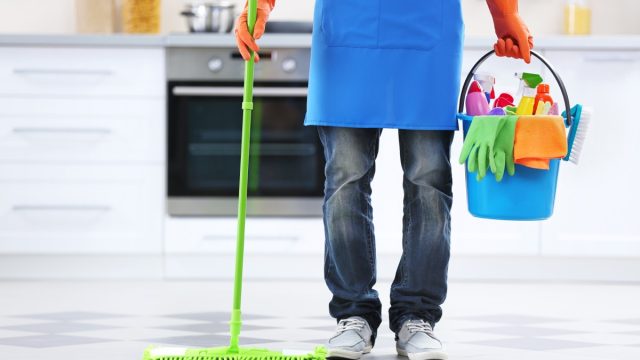
They say the kitchen is the heart of a home. It’s where people tend to congregate during parties (no matter how cramped it is), and it’s likely where you spend a good chunk of your day—whether you’re filling up your water bottle, staring into the fridge looking for a satisfying snack, or making dinner. Because it gets used so much, it makes sense that your kitchen is probably also the room you spend the most time cleaning. That’s why it’s important to avoid a few common kitchen-cleaning mistakes that experts say could endanger your health.
Read on to find out what cleaning professionals say you could be doing wrong when you’re cleaning your kitchen—and what you should be doing instead.
READ THIS NEXT: This Common Cleaning Product Could Be Hurting Your Liver, Experts Warn.
1
Not using a fresh sponge
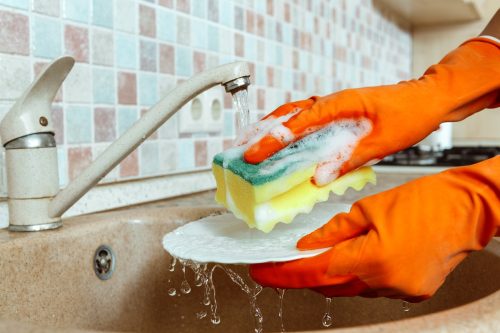
How long has that sponge you’re using been sitting next to your sink?
“A sponge is an ideal environment for bacterial growth, especially when it’s used for an extended period,” says Armeka Townsend, cleaning expert at Zep. “Using a dirty sponge to clean utensils or surfaces can spread bacteria, leading to food poisoning and other health problems.”
Townsend recommends replacing your kitchen sponge “every few weeks,” and says you can sanitize them between uses “by microwaving them for a minute or putting them in the dishwasher.”
2
Using bleach
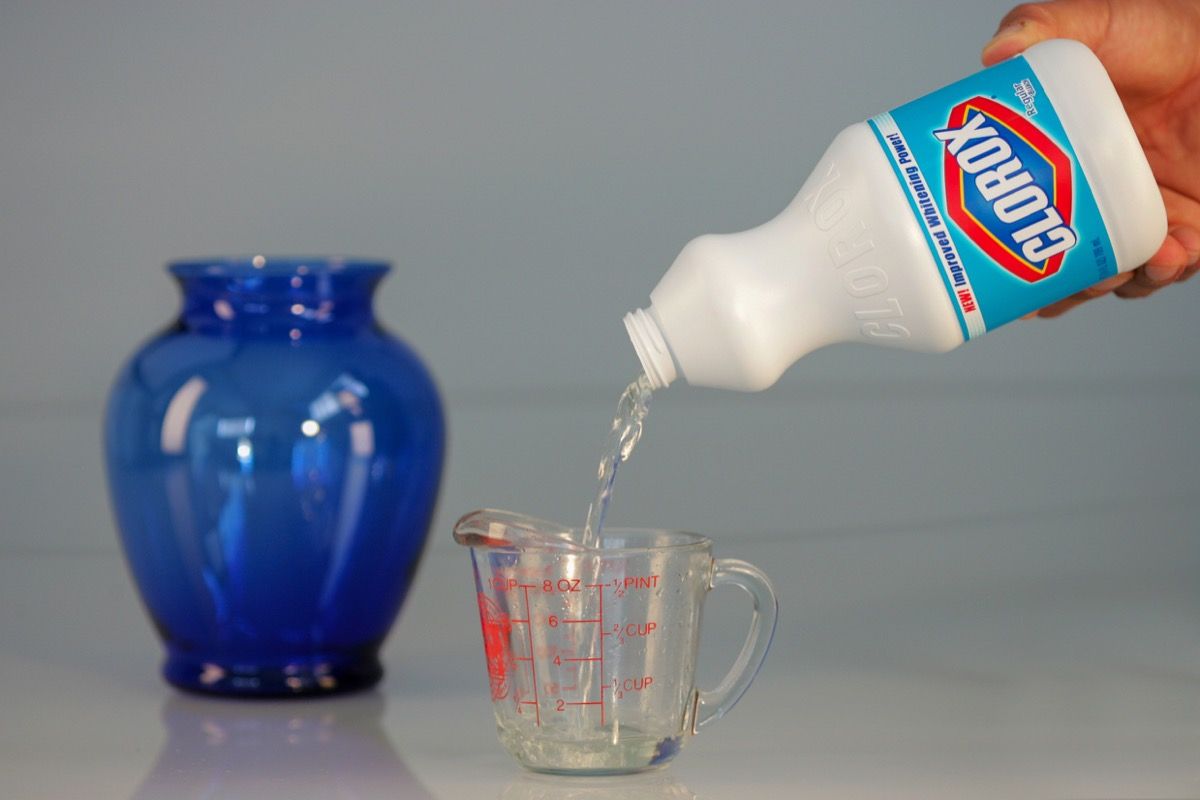
For some of us, the smell of bleach alone is enough to signal cleanliness—but in fact, experts discourage using bleach to clean your home, for various reasons.
“Many bleach-containing products have chlorine-containing compounds,” mold and air quality expert Michael Rubino, founder of HomeCleanse, tells Best Life. “These fumes can negatively affect indoor air quality and trigger adverse health reactions.”
In fact, Rubino says, bleach isn’t even as effective a disinfectant as you might hope. When it comes to mold, he notes, “The roots of mold can grow within the surface itself, depending on the porosity. In order to get rid of the colony, you’ve got to treat it like a weed and pull it up by the roots. Otherwise, it can grow right back. Bleach cannot effectively deal with the roots on porous and semi-porous surfaces, allowing the contamination to persist.”
READ THIS NEXT: 6 Foods in Your Kitchen That Are Bringing Mice Into Your Home.
3
Combining cleaning products
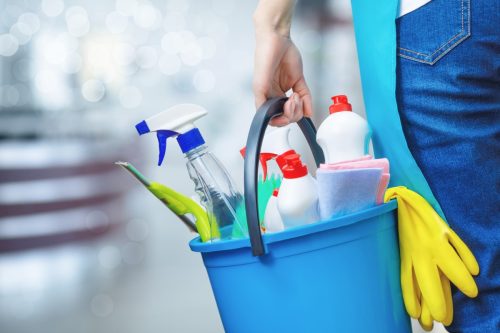
If you’re really going to town scrubbing and sanitizing your kitchen, you might think it’s a case of the more, the merrier when it comes to cleaning products. But if you’re using multiple sprays, wipes, and disinfectants, exercise caution.
“Combining different cleaning products can create toxic gases, which can be harmful if inhaled,” Townsend explains. “For example, mixing bleach and ammonia produces chloramine gas, which can cause respiratory problems and even lead to death. Similarly, mixing bleach and an acid-based cleaner can produce chlorine gas, which can cause irritation to the eyes, skin, and respiratory system.” (One more reason to skip the bleach altogether!)
She emphasizes the importance of reading and following the instructions on the products you use to clean—and to be safe, says to avoid combining them and to open a window or run a fan to make sure your kitchen is ventilated while you clean.
4
Neglecting to clean spice rack jars
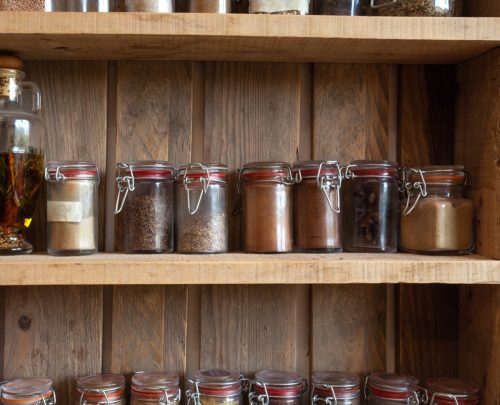
A recent study highlighted the importance of making sure your spice rack is properly disinfected—and Townsend echoes this concern.
“Spice rack jars can harbor bacteria and mold if not cleaned regularly,” she explains. “These contaminants can cause food poisoning, allergic reactions, and respiratory problems. It is essential to wash spice rack jars regularly and ensure they are completely dry before refilling them.”
For more health advice sent directly to your inbox, sign up for our daily newsletter.
5
Putting dishes away when they’re still wet

Your spice jars aren’t the only things you need to dry thoroughly after cleaning. You should always make sure your dishes are dry before putting them back in the cupboards, says Rubino. “Putting away dishes that are wet … can create moisture-rich environments that allow for microbial growth,” he says. “Instead, allow everything to dry completely before putting them away.”
So if you’ve got kids or houseguests, putting them to work drying dishes doesn’t just safeguard your health—it gives you a chance to chat about your day, and maybe even catch up on some gossip. Win-win!
6
Forgetting to clean your refrigerator’s water spout

Your kitchen is likely filled with small appliances that need to be cleaned regularly, says Rubino. He lists your dishwasher, coffee maker, blender, juicer, microwave, and air fryer as ones to watch out for.
“Appliances are some of the top places for microbial growth in the kitchen because of their use of moisture,” he says. “Cleaning them frequently using botanical cleaning products with surfactants helps remove contaminants like mold spores and mycotoxins, as well as food sources such as mineral buildup. Check with the manufacturer’s instructions for their suggestions on cleaning methods, products, and frequency.”
One appliance that’s easily overlooked is the water dispenser inside your refrigerator. Cleaning the water spout attached to it is critical, Rubino says. Give it a good wipe-down next time you’re cleaning surfaces in your kitchen—and dry it off when you’re done, he reminds us.